Then, from sharing and understanding with another soldier in the same situation, the two people came together naturally like the breath of soldier love. And life later compensated, opening for them a peaceful, complete home after the storm of war.
Mrs. Phan Thi Bien Khoi, born in 1948 in Dong Trach commune, Bo Trach district, old Quang Binh province (now Dong Trach commune, new Quang Tri province), her childhood was marked by war. At the age of 14, while studying in secondary school in the village (1962), little Bien Khoi skipped school many times to work as a liaison for the army.
Four years later, in 1966, she became one of the first female soldiers of Quang Binh to be assigned to the newly established Route 9 Front (B5). The initial Command Headquarters was located in Khe Sung village, Ngan Thuy commune, Le Thuy district, Quang Binh; from 1969 to 1971, it moved to the western part of Vinh Linh, Quang Tri province, bordering Huong Lap commune (Huong Hoa), Le Thuy (Quang Binh) and Savannakhet province (Laos).
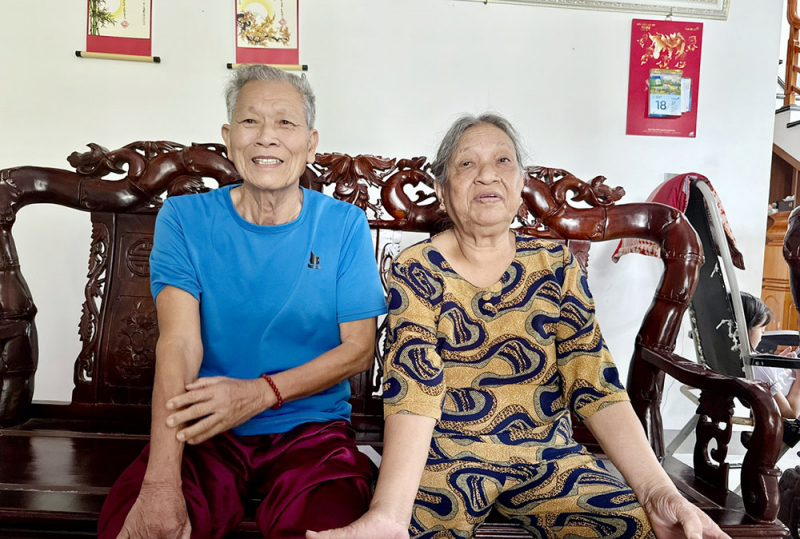
In the place where the smoke of gunfire never ceased, in early 1969, she met Lieutenant Le Binh Chung (born in 1944, from Quynh My commune, Quynh Luu district, former Nghe An province). Between shooting practice sessions and cold guard nights, the two young people quietly cherished their love. Their love was like a stream flowing through bombs and bullets, silent but lasting. After more than a year of keeping their feelings secret, they had to part before they could make it public.
At the end of 1969, Ms. Khoi was seriously injured and contracted malaria, so she had to go to the North for treatment. Fearing that her happiness would pass, as soon as she returned to her unit in January 1970, she boldly asked her superiors for permission to hold her wedding ceremony with Mr. Le Binh Chung.
At that time, the war was increasingly fierce, the battlefield from Route 9 - Southern Laos extended down to Dong Ha to Quang Tri Citadel, with continuous fighting; the US and the Saigon Army bombarded day and night, carpet-bombing and destroying with hundreds of thousands of tons of bombs and ammunition from the 7th Fleet in the East Sea and from the air.
Ms. Khoi's health had not yet recovered, so her superiors suggested that she be discharged from the army - a wartime policy aimed at transferring soldiers who were not strong enough to the rear to both directly produce and contribute to making food for the battlefield, and to be a solid rear for soldiers going into battle.
The small wedding in Dong Trach commune that day was special: no dowry, no white dress; only soldiers and neighbors were witnesses to the love of the young couple - a love complete by the beating of two hearts. After the short wedding night, the young lieutenant put on his backpack and went to battle. The girl, still imbued with the scent of love, also in a simple military uniform, quietly saw her husband off through the wet village road under the spring rain; she tried to hold back her tears, walking quickly back to the village as if afraid of catching her husband's backward glance.
After returning from the army, the local government assigned her to work as a commune militia officer and to command agricultural production development. Then she realized she was pregnant and happily told her husband the good news. In a letter sent home, he said: “If it is a girl, name her My Binh, if it is a boy, name her Quang An – combining the two hometowns.”
In October 1970, she gave birth to a baby boy named Le Quang An, while her father was still fighting in Quang Tri Citadel. In early 1972, he was allowed to return home on leave, held his son for the first time, and met his wife with great joy. However, the wartime soldier only had time to be with his son for a moment before returning to the battlefield.
In the context of increasingly fierce fighting, many elite officers and soldiers were mobilized into core units at Quang Tri Citadel to repel the Saigon army, creating weight at the Paris 1973 negotiation table. Lieutenant Le Binh Chung from the B5 Front was reinforced for the 325th Division, continuing the journey on the fiercest fire line.
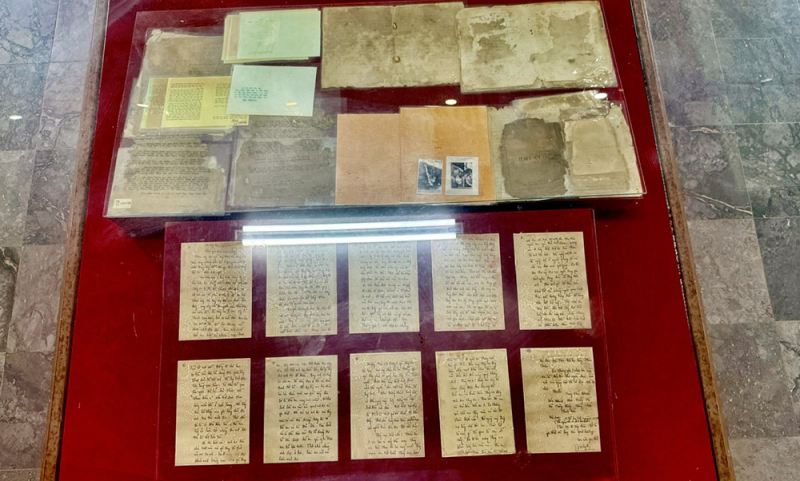
Entering the final days of the 81-day war in the fiery summer of 1972, he and his comrades fought steadfastly until their last breath. After the Citadel, the war did not stop. Like many fathers, mothers, and wives in the rear, Ms. Bien Khoi waited for news of her husband every day, believing that he was still holding a gun on the front line. But then, not long after, the terrible news struck like a thunderbolt: Lieutenant Le Binh Chung had sacrificed his life on the battlefield of Quang Tri Citadel.
From then on, Ms. Bien Khoi became less talkative, but her eyes still radiated an enduring strength - the strength of hatred for the enemy and of faith in her fallen husband, that the country would be peaceful and unified, the North and South would reunite; the communists would continue to build, bringing prosperity and peace to the people. After two years of working as a commune team cadre and participating in an agricultural production cooperative, she was assigned by the Bo Trach District Security Department to work as a police officer in Dong Trach Commune. By the end of 1975, she was retired due to disability.
Now, in the spacious and well-furnished house in residential group 8, Dong Thuan ward, Quang Tri province, the chirping laughter of children and grandchildren resounds warmly. Unlike what we imagined before the trip - intending to ask Mrs. Bien Khoi after her husband's death - when we entered the house, we were surprised, thinking we had the wrong address. The person who came to greet us was not an old woman but a man in his 80s, slow-moving, with a gentle smile.
When listening to our presentation, he gently said that he was Mrs. Bien Khoi’s husband. From here, the story of three people – about the resistance war against the US to save the country, about the pain and loss caused by war, as well as the goodness and grace of life – gradually appeared like a picture with many vivid colors.
During her time off due to disability, Ms. Bien Khoi met and got to know Mr. Hoang Huu Trach, who was then a military officer working at the Quang Binh Provincial Military Command. Mr. Trach was born in 1942, from residential group 8, Dong Thuan ward, the new Quang Tri province. One was a widowed mother with an orphaned child, the other a single father, so they easily sympathized, shared, and helped each other with the heavy work and taking care of the children. Then they decided to live together under one roof through a simple, quiet wedding ceremony, with the encouragement of family, friends and comrades.
(To be continued)
Source: https://cand.com.vn/Phong-su-tu-lieu/ky-i-tu-thanh-co-quang-tri-den-mai-am-yeu-thuong-i783513/


![[Photo] General Secretary To Lam visits Kieng Sang Kindergarten and the classroom named after Uncle Ho](https://vphoto.vietnam.vn/thumb/1200x675/vietnam/resource/IMAGE/2025/10/09/1760023999336_vna-potal-tong-bi-thu-to-lam-tham-truong-mau-giao-kieng-sang-va-lop-hoc-mang-ten-bac-ho-8328675-277-jpg.webp)




![[Photo] President Luong Cuong attends the 80th Anniversary of the Traditional Day of Vietnamese Lawyers](https://vphoto.vietnam.vn/thumb/1200x675/vietnam/resource/IMAGE/2025/10/09/1760026998213_ndo_br_1-jpg.webp)




![[Video] Vietnam participates in building a strategic vision for ASEAN sports](https://vphoto.vietnam.vn/thumb/402x226/vietnam/resource/IMAGE/2025/10/10/1760058220387_dung00-36-12-23still010-jpg.webp)













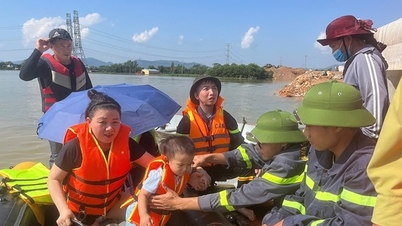
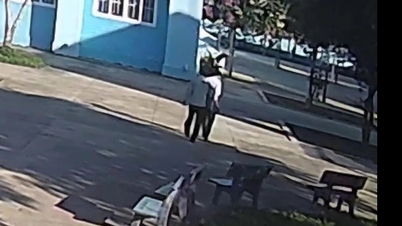


























![[VIDEO] AI version of BSR General Director Nguyen Viet Thang: From the mission of energy shield to the desire to contribute](https://vphoto.vietnam.vn/thumb/402x226/vietnam/resource/IMAGE/2025/10/10/1760062415027_0000371c-f2a1-31a0-38a9-e3de0ece2bbd.jpeg)











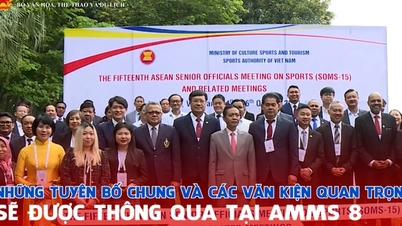















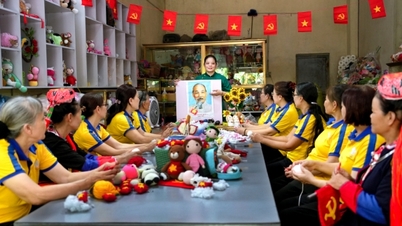

















Comment (0)